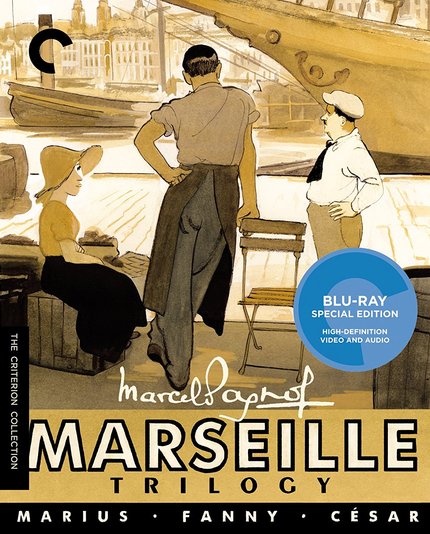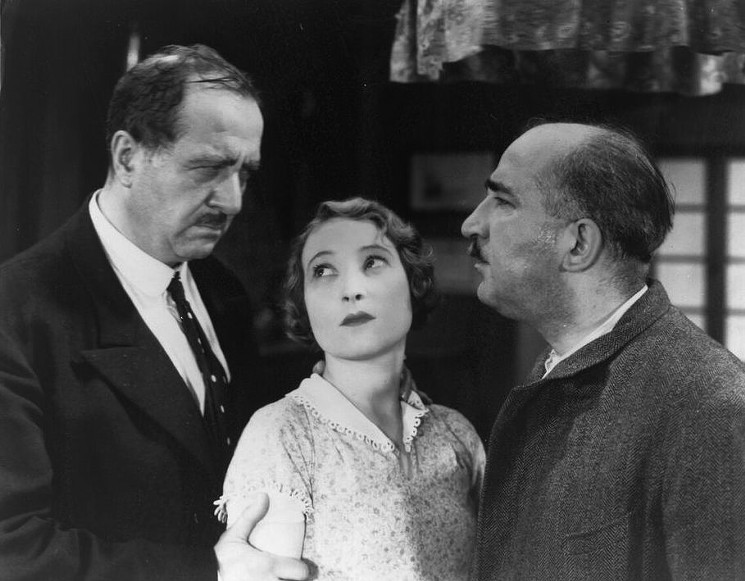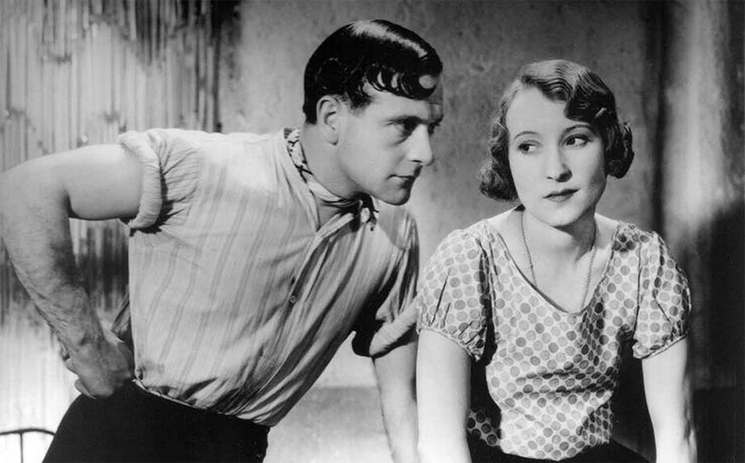Blu-ray Review: The MARSEILLE TRILOGY Docks with Criterion
Marcel Pagnol's classic French films, MARIUS, FANNY and CESAR are on Blu-ray from Criterion.

Just because community is a beautiful thing never means it's an easy thing. Family relations, most everyone knows, can prove especially dicey. Even in comedies. Especially in comedies.
In the early 1930s, just as the movies were learning to talk, French theater playwright and impresario Marcel Pagnol honed in on this truth as he brought his now-revered Marseille Trilogy to motion picture screens. Released between 1931 and 1936, the three films, Marius, Fanny and César, boast a cozy continuity in characters and the terrific actors playing them, not to mention their provincial seaside location.
Originating on stage in Paris, Pagnol's initial entry, Marius, proved to be a popular hit as a film as well as a play. It immediately gave way to a followup one year later, Fanny, a seamless continuation of the trials and travails of the colorful characters. Audiences of the day had a longer wait for the third film, César, which wrapped things up.
The only one of the three to begin as a film, César didn’t materialize until five years later. When it did finally debut, it was Marcel Pagnol himself in the director’s chair. Prior that that, Pagnol opted for a strictly producerly role. No less than the great Alexander Korda, early in his own career, directed Marius, while Marc Allégret helmed Fanny.
As the overall title indicates, the series takes place in a picturesque port neighborhood of Marseille. Although Marseille is the second largest city in France, one would never know it based upon the decidedly small town vibe that permeates Pagnol's series. The prolonged exchanges between the title characters and their contained circle of longtime friends and acquaintances ring of a universal relatabilty, even while indelibly rooted in the time and place of its making.

Performance-based films through and through, there's something wonderfully colloquially curt about the way these people relate to one another. Outburst after outburst, there is nonetheless an unassailable elegance underscoring the frankness, the brashness, of how these people get along and what they say. Card playing buddies one minute, on the brink of a fistfight the next. All are missed when they're gone.
Amid the many highly enjoyable foibles and asides that these films deliver, there's an ongoing tale of familial unease and even tragedy. In the first film, 1931’s Marius, we meet the ensemble whose collective tale will unfold over the course of the three films. The title character (played by Pierre Fresnay) is the only son of the trilogy's central character, César, a pompous yet utterly magnetic steamroller of a man played with sparking gusto by the great French actor, Raimu. Working in his father's bar and flirting with the neighboring young lady, Fanny (Orane Demazis), simply isn't enough to satisfy his mounting wanderlust.
Yet, Marius' and Fanny's lifelong Sam-and-Diane act inevitably takes that next step towards real romance. Fanny, already locked into what will be a life of acquiescing to men, tearfully releases the love of her life so that he may pursue his seafaring dreams. As for Marius, he can't help but indulge the offer.
To go to the Looking Glass for a moment, a certain one of Earth's greatest musical compositions - perhaps the greatest, if Kurt Russell is to be believed - nearly goes, "Fanny, you're a fine girl/What a good wife you would be/But my life, my lover, my lady is the sea". Indeed, before "Brandy (You're a Fine Girl)” was so effectively appropriated by James Gunn's Guardians of the Galaxy Vol. 2, it may have sprung from the well of Pagnol's trilogy.
Marius may be the most directorally accomplished of the bunch, but all three films offer no shortage of enjoyment in their subtle hyper-focus on human quirks, foibles and eccentricities. Fanny (1932), as the title indicates, focuses on Marius' abandoned lover whom now realizes she's pregnant with his child.
As the news of this slowly trickles out among her close friends and relatives, a plan ultimately emerges. Fanny will marry Panisse (Fernand Charpin), an older, wealthy shop owner who's made no secret of the torch he carries for her. Claiming to having always wanted a son, he promises to raise Fanny's unborn child as his own, alongside of her. The child (whom everyone simply assumes will be a boy) would be set for life financially, but would never know of his true father.
Finally, in the film César (1936), we jump ahead twenty years, give or take a few, and meet Césariot (André Fouché), the grown son of Fanny. Césariot, the true lead of this film, endeavors at long last to seek out his true father. His quest takes him away from Marseille, in search of Marius.
The emotional weight of this final film is greater, if only due to the natural changes brought on from the time jump, as well as the fact that we now know this world and these characters so well. We are able to quickly register how Marius has grown and settled as a person - and how he hasn't.
Criterion's release of the trilogy, available only as a box set, is a completely classy and attractive affair. Everything from the outer box art to the unbelievable pristine quality of the black and white images of the films is most impressive.
The sound is particularly noteworthy, considering how scratchy the talkies of this newfangled sound era can be. There is, in fact, very little that screams "early talkie" in these films - a subtle but important achievement to be appreciated, then and now.
The extras are spread across the three discs, resulting in satisfying yet wholly digestible deeper digs into the life and career of Pagnol, the actors, the area, and why the series endures. Finally, there's a beautiful fifty-six page book of photos and essays new and old.
For connoisseurs of classic French cinema who've fallen into the lazy habit of online streaming binges, The Marseille Trilogy is perfect. The series presents as a prestige television series from before the medium of television was ever invented, with Pagnol as the prototypical showrunner. The actors, in complete ownership of their characters, remain while directors come and go. Standing sets in a permanent location, yes; auteurist visual flourishes, no. It's easy to get caught up in the soap opera at the center of it all, and even easier to spend time with these people.
All in all, Criterion's Blu-ray presentation of the Marseille Trilogy is a refreshing breeze on a late summer night, a community through cinema if there ever was one.








